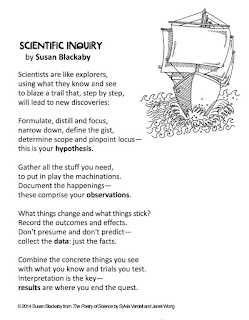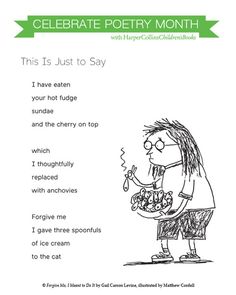Lee Wardlaw claims her first spoken word was ‘kitty’. Since then, she's shared her life with more than two-dozen cats and published more than two-dozen, award-winning books for young readers. Lee has won many awards, including the Lee Bennet Hopkins Poetry Award and the Myra Cohn Livingston Award for Poetry, both for the delightful picture book Won Ton: A Cat Tale Told in Haiku.
The newly released companion title, Won Ton and Chopstick, is a 2015 NCTE Notable Poetry Book and a BookSource Scout Award Winner for Children's Poetry. Lee lives in Santa Barbara, CA, with her family, which includes two dog-disdaining cats. Welcome, Lee!
1. How do you get into a place or mindset for writing your poetry? Do you have any habits you could share with young writers?
I've found that a long walk works best to get me started. After I've been walking for a few minutes, my mind slips into a trance, and I just let images and words and sensorial experiences bubble up from my subconscious. (Some of the best dialogue between characters in my novels starts out that way, too!) I'll walk for an hour or more, and when I get home I don't even remember the roads I took or the homes I passed. I just have a gush of ideas that need to be drained into the closest notebook. Often, I get the first line and the last line of a poem that way, which is helpful because I never start writing the actual poem until I know where I'm going with it.
If a walk isn't convenient, I curl up in a chair with a notebook and a cat, and brainstorm. (I also brainstorm in restaurants, or in my car, or wherever I am when I have a few free minutes.) Sometimes, the brainstorms are random scribbles; other times, I actually begin with specific categories, and play off those. Here's a picture of one of the brainstorms I did for my newest book Won Ton and Chopstick: A Cat and Dog Tale Told in Haiku. I'm always been a cat person, so I don't know much of dogs. In this storm session, I wrote down everything I could think of about dogs to get an idea of what the puppy in the story would be like, and what kinds of puppy-isms might contribute to the plot.
 |
| Lee's brainstorming for Won Ton and Chopstick |
 |
| Lee's dinner brainstorming |
It depends on the mood I'm in! If I'm feeling silly, I delight in words such as 'weasel' or 'cumberbund'. I also like words that when you see them written, you're not quite sure how to pronounce them, like Phoebe or calliope. (I love the word calliope! Say it out loud: cah-LIE-oh-pee. Listen to the sounds…feel how your mouth purses and stretches!) I enjoy making up words, too, when I can't find one that exactly fits what I'm trying to say. Not long after my husband and I got married (33 years this summer), I came up with the word 'miffled' to describe how I felt whenever he'd come home late for dinner without calling first. 'Miffled' was a combination of 'miffed' and 'ruffled'. (I now see that 'miffled' is in the Urban Dictionary as being a combo of 'miffed' and 'baffled'.) In my middle grade novel 101 Ways to Bug Your Teacher, I use the word 'goose-blisters' to describe a particularly scary and shaming moment - - and how that moment feels physically to my protagonist.
3. What are three books of poetry you'd like to see in every child's home, for them to dip into whenever they want?
I love-love-love All the Small Poems and 14 More by Valerie Worth. Worth is a master at writing succinct, simple poems about common, ordinary objects - - a key, a coat hanger, a thread of string - - and exalting them to extraordinary things.
Where the Sidewalk Ends by Shel Silverstein is, of course, a MUST for its silly wit and wisdom and poems that everyone can relate to!
Last, I think every household should have a good book of nursery rhymes. One of my favorites is My Very First Mother Goose, edited by Iona Opie (the noted folklorist) and endearingly illustrated by Rosemary Wells. (I'm a huge Wells fan. I love the sweet exuberance of her bunnies, and kittens, and bears.)
4. Is there a poem you have memorized that you can share a snippet with us? Maybe it's something you say to yourself when you need encouragement or just when you want to delight in the power of words.
My memory isn't what it used to be, but I can still recite by heart "Three Cheers for Pooh" by A.A. Milne, a poem I've loved since age 3 or 4. It never fails to make me giggle. I can also recite "The Walrus and the Carpenter" and "Jabberwocky" by Lewis Carroll. The first stanza of "Jabberwocky" appeared in a magazine in 1855, and was titled "Stanza of Anglo-Saxon Poetry". Later, Carroll expanded it, turning it into a story poem. Here's that first stanza:
'Twas brillig, and the slithy tovesI love the word play in this poem, especially since so many of the words Carroll invented are now in our dictionary - - words such as "chortle", "burble" and "galumph". How frabjous is that?!
Did gyre and gimble in the wabe;
All mimsy were the borogoves,
And the mome raths outgrabe.
Thank you so much, Lee! Thank you so much for sharing your love of poetry with children and families. I love this video of you reading Won Ton and have to share it with readers.
If you make a purchase using the Amazon links on this site, a small portion goes to Great Kid Books. Thank you for your support.
©2016 Mary Ann Scheuer, Great Kid Books














































